Jared Gulian’s journey from city slicker to Moon over Martinborough olive oil
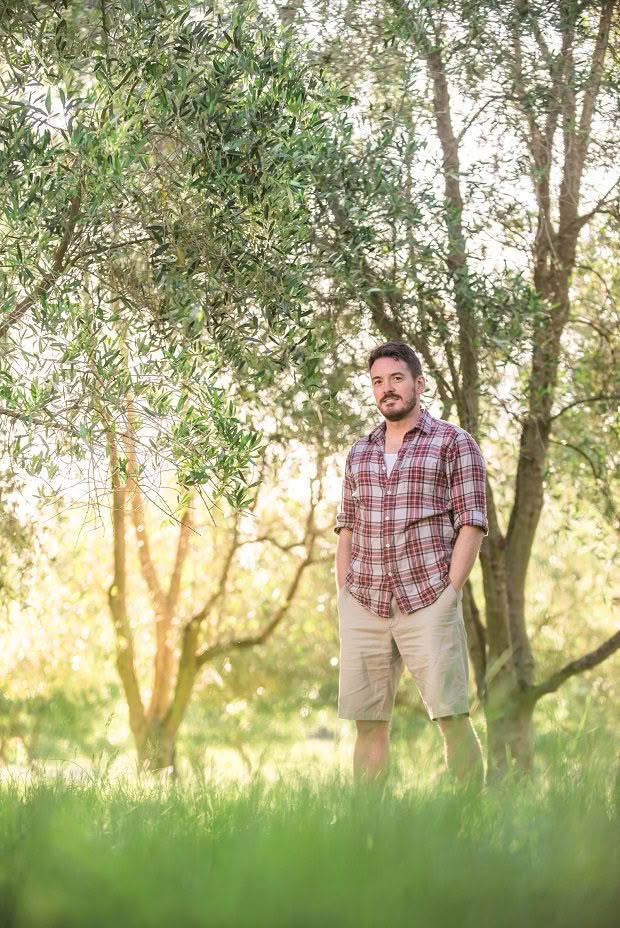
Jared Gulian had always lived in the city, but these days there’s nowhere else in the world he’d rather be than on a small block in Martinborough in the dappled shade of his olive grove.
Words: Nadene Hall
Images: Mike Heydon
Who: Jared Gulian
Where: Martinborough, an hour’s drive north-east of Wellington
Land: 8ha (20 acres)
Livestock: cattle, sheep, pigs, chickens
Web: www.jaredgulian.com
“It was a gorgeous September spring morning in 2006, and CJ and I were climbing into our car for a day trip to Martinborough. We were going because CJ had proposed something radical. He had proposed we settle. We were off to look at CJ’s Fantastic New Idea. I was extremely sceptical.”
The traumatic drive over the infamous Rimutaka Hills, north of Wellington, was enough to convince Jared Gulian that his partner CJ’s idea to buy a block in the Wairarapa was nuts.
“I thought he was crazy and I told him so!” laughs Jared. “He was in the Wairarapa for his work and he’s always loved property… he was looking in the window of a real estate agent there, saw a place and thought ‘I’d like to go see that, it’s near to what I’m doing.’ It was just out of curiosity but he completely fell in love with it… that’s when he came home and told me how great it was, and I absolutely refused to even look at it.”
That’s not a surprising reaction from someone who had grown up and always lived in large cities in the USA and Japan. But somehow CJ convinced Jared to have a look and that was all it took for Jared to fall in love.
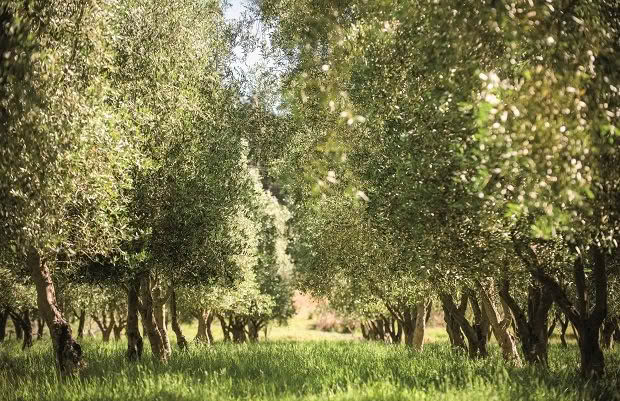
The olive grove feels like a magical, sheltered place says Jared. “It’s part hedge maze, part grassy meadow and part tree-lined reserve.”
“The house is cute, there’s a goldfish pond, a trumpet vine, roses… but it was the olive grove for me. The first time I saw the olive grove the sun was coming across the branches, the leaves had that silvery-green underneath that catches the light so beautifully… when we were walking into the grove we saw the sheep grazing and I had a real moment of ‘wow, this is incredibly beautiful and why wouldn’t I want to take care of it, why would I want to move here?’”
“One night that first summer CJ and I shut off the lights in the main room, ready to go to bed, and suddenly we were surrounded by bright, silver-blue light… I stepped out the back door and into the night… walked across the backyard to the side of the house and looked up. There in the sky was the biggest, fullest, brightest moon I had ever seen.”
As it turned out, living and travelling for years through south-east Asia had prepared Jared and CJ for country life.
“It was a real leap of faith, but we’ve travelled quite a bit in our lives and always been open to the unknown and I think we approached it with that same sort of spirit. When you travel to a country you’ve never been to before, it’s best to follow the rules of the land you’re in and respect the people there and things usually go ok.”
That meant learning the local lingo for the two US-born-and-bred city slickers.
“American English and New Zealand English are different, and then there’s rural things people talk about. I just learned a new word three weeks when someone asked if I could help with their sheep that had a bearing. I had no idea what she was talking about then we walked down to the paddock and I saw what it was and I was horrified – I still managed to help her though!”
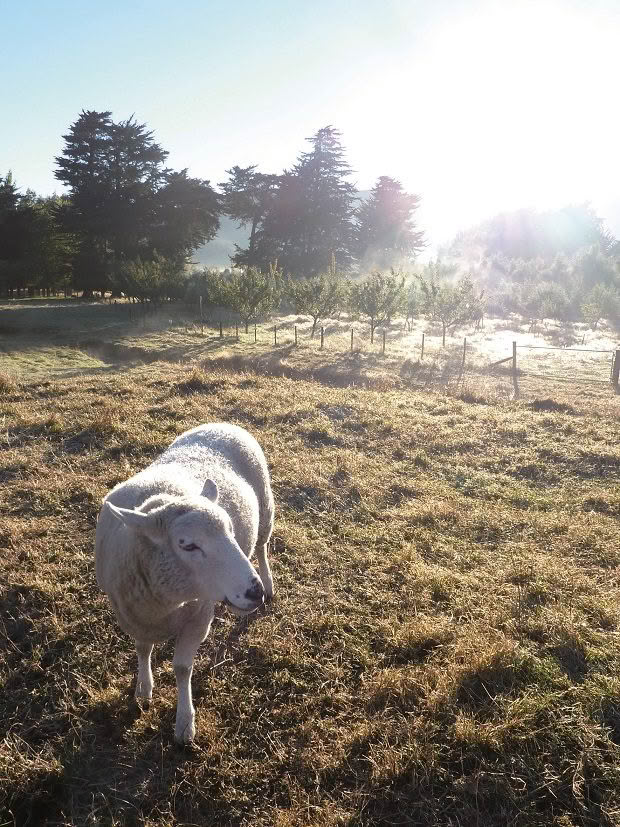
Sweetie the pet sheep, who has a dangerous addiction. Don’t let her charming demeanour fool you. She just wants you to give her chicken feed.
One of the big projects to get their heads around was the 500 neglected olive trees in the grove below the house. Their block also has a large collection of fruit and nut trees including apricots, peaches, pears, plums, chestnuts, almond, pine nuts, feijoas and quince.
Jared and CJ spent much of their first summer reading about growing olive trees and oil production, then tending to the pruning of suckers, the weed-whacking of the long grass, and discovering exactly what they had to work with thanks to a map provided by Priscilla, the previous owner who had planted the trees.
“When we moved in, all 500 of those trees were just olive trees to me, and they pretty much looked the same. But… walking through the low-angled light that day, I saw every single one of our different cultivars, or varieties of olive trees. Here were the Manzanillo. There were the Barnea. On this side of the grove were the Frantoio and Leccino. On that side were the Nabali. They were all different.”
Jared’s blog started as a weekly round-up of their adventures, inspired by a poet who visited their block while Jared was taking part in a Victoria University writing course.
“I’d never thought about writing about this place, but he thought people would love to read about it so I decided to start a blog.
“In my first month I had all of 12 page views and I think half of those were my mother! I wrote a new story every week and we’d been on the property for two years by then so I had a backlog of crazy things that had happened.”
The blog quickly grew in views due to his simple marketing strategy. He would think up a topic, for example culling a chicken, then research it, finding other blogs around the world on similar topics. He’d then leave a comment on their blog, contributing to their conversation, but also including a link to his own story.
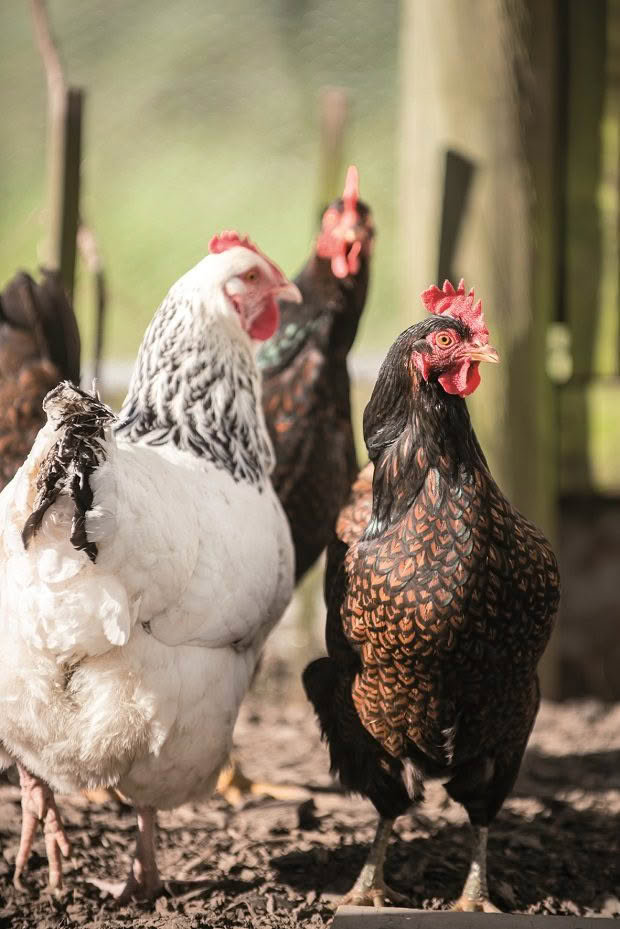
Ethel on the left and her two adopted daughters, the Barnevelder Sisters, on the right. Ethel was a very protective mother when those girls were chicks.
“A lot of people found my blog that way, traffic started going up, people started hearing about it.”
For a long time the most popular topic was scaly leg mite in chickens, until the day he unveiled one of CJ’s best-kept secrets.
“The biggest draw is his carrot cake recipe. I can’t tell you how many people have read that recipe, I think I get about 100 hits a day just on that. I have to say it’s a very good recipe – it’s the best carrot cake in the world – it brings me so much traffic.
“Unfortunately the secret to it is equal parts sugar and flour, it’s got a lot of sugar in it, but it’s really delicious. And the cream cheese frosting. Whoever thought of it was really smart.”
The blog eventually became a book that launched in 2013, making it onto the best seller’s list for six weeks (getting as high as number four), with lots of coverage on TV and radio, giving many people a taste of their good life.
“I tried to write about the work but it’s funny because a lot of people think our life is all perfect – and it’s great, I wouldn’t trade it for anything – but people forget there’s a lot of hard work.”
The gorgeous pictures in the book (as you see in this article) give the impression of an idyllic existence but that isn’t the reality says Jared.
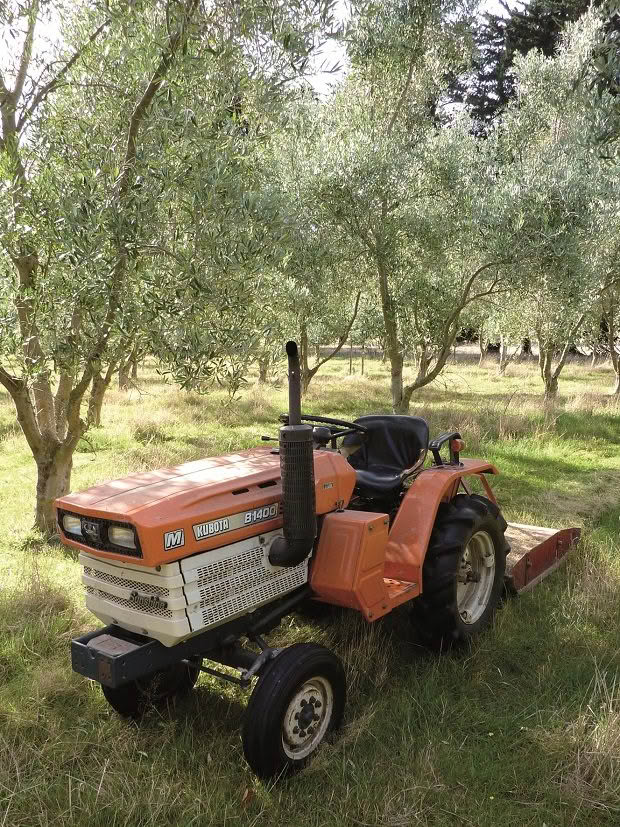
Sunshine the Tractor in their grove. Neighbour John has let them borrow that tractor more times than they can count. Notice the short exhaust pipe sticking up at the front — one of CJ’s infamous ‘improvements’.
“There were definitely moments when we thought we’d made a huge mistake! In the first year, it was such a big challenge, all we could get our heads around was trying to keep the grass down. Pruning trees? Forget that, keeping the grass down was a big accomplishment!”
If there’s one thing that does come across repeatedly, it’s Jared and CJ’s attitude towards wholeheartedly embracing country living.
“I tell people if CJ and I can do it, anyone can do it. We didn’t know anything at all about country life when we moved out here, and I think what helped us in hindsight to be successful was we never pretended to know things we didn’t. We always asked the people around us who knew more than us … it changes the dynamic and then you do everything you can to help them back in whatever way you can, whatever skillset you have. I’ve helped neighbours with their computers and email and websites. I still remember the first day CJ came home from helping the neighbours for the first time, actually being able to reciprocate was a very important moment for us.”
Although their neighbours are physically further away than they ever were when they lived in apartments in cities, they are much closer.
“I think the acknowledgement of reciprocation is important in a community, it’s a very practical thing but it has a very nice consequence. You can’t do everything yourself so you’re naturally interdependent on the community around you which connects you to people.”
Lessons from a beginner olive farmer
When Jared and CJ took over running their block, they knew nothing about olives, but they were determined to learn.
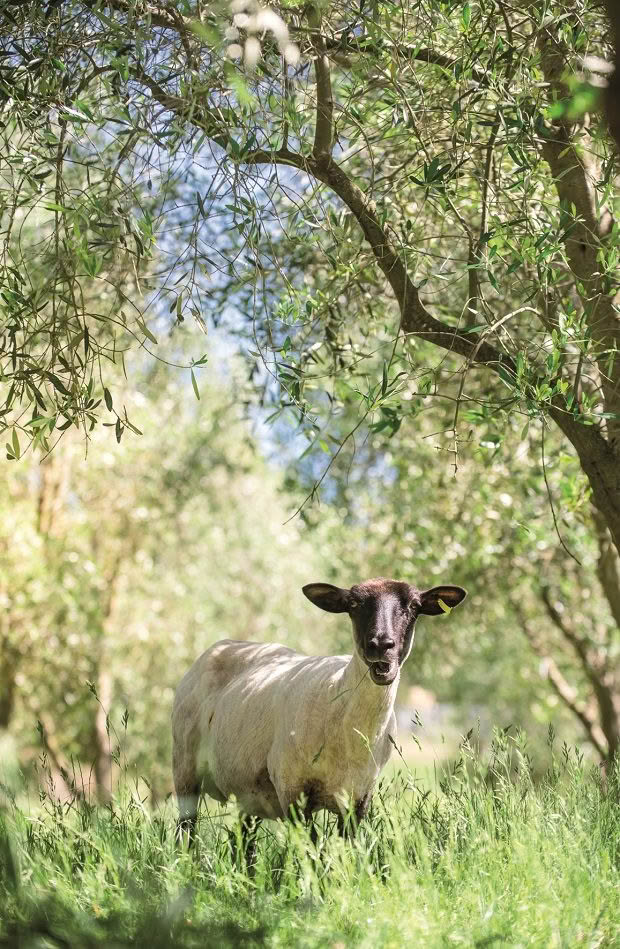
Instead of using nasty chemicals to keep the grass down around the base of the olive trees (a common practice in commercial groves), we use sheep. This is Bonnie, twin sister to Clyde.
They mowed the paddocks religiously with the neighbour’s Kubota tractor before discovering the beauty of sheep as grass removal specialists (so long as you remove them for the few weeks the sap is running so they don’t eat the bark).
Jared underwent training on a neighbouring farm before their first harvest – carefully gathered up by friends who made a special trip – and they reaped 193kg of olives from a grove that hadn’t had a lot of love, and 31 litres of a murky oil with an overall yield of 16%.
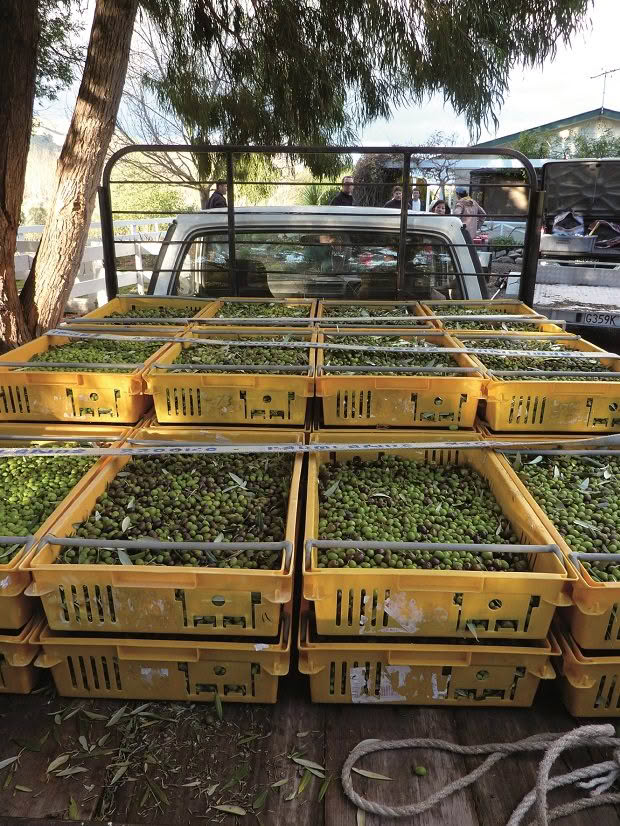
The harvest ready to go to the press, picked by their friends and neighbours, packed into neighbour Helen’s crates, and sitting on the back of neighbour John’s ute. It takes a village.
“I could see very plainly that the olive oil inside that small jar bore no resemblance at all to the mass-produced supermarket oil I’d known my entire life. This was a different creature entirely. This was the real deal.”
In their second year, the trees had no fruit. There was much testing and then a visit from specialist advisor Andrew-of-the-Olives who could find no fault and came to the only conclusion he could: it was just one of those things.
Year 3 saw the trees groaning under the weight of the olives and an exhausting harvest that produced 383kg of olives and 48 litres of oil. Their report card from the pressing company read:
Oil colour: vibrant rich green.
General comments: Clear oil – stunning!
While theirs is a boutique product, Jared and CJ take great pride in their olive oil. They have even sold it at Moore Wilson’s in Wellington, and in local food stores.
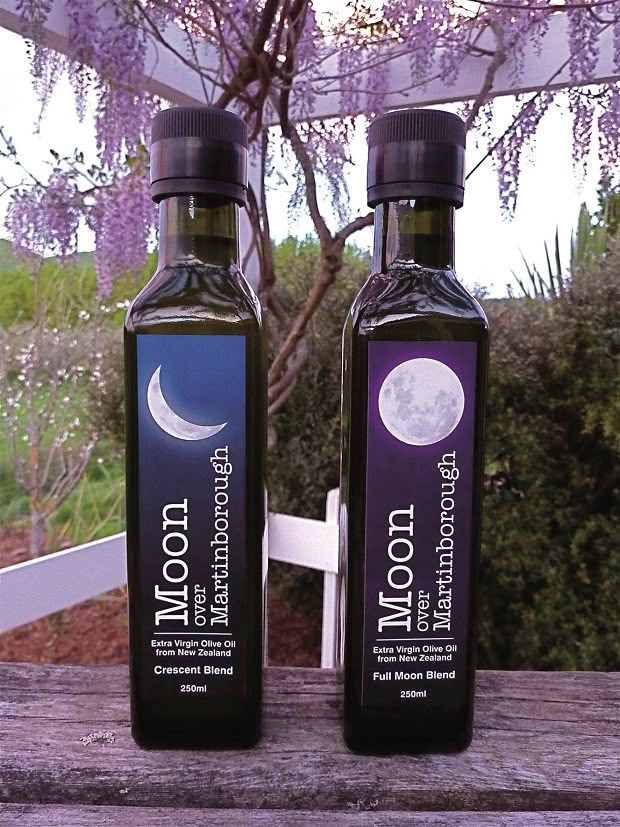
Their two extra virgin olive oil blends. The Crescent Blend has beautiful green tea and butter flavours, from Barnea and Manzanillo olives. The Full Moon Blend has a gorgeous, grassy opening with a peppery finish, from Frantoio and Leccino olives.
“Our olive oil is a labour of love, we only started doing it commercially because people were reading about it on the blog. It’s just a fun adventure and we’re not at risk of being able to quite our day jobs yet but it’s something that we love so much and we’ll continue doing it as long as we love it.”
Update, November 2017: Jared is finishing work on an international edition of Moon Over Martinborough which will be published under a new title, An Olive Grove at the Edge of the World. You can get updates on Jared’s Facebook page.
Love this story? Subscribe now!
 This article first appeared in NZ Lifestyle Block Magazine.
This article first appeared in NZ Lifestyle Block Magazine.
